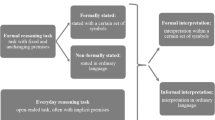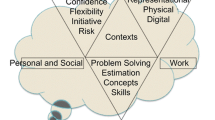Abstract
From a sociological theoretical perspective the crisis of knowledge appears to be characteristic of a knowledge society in which the importance of knowledge has increased but the importance of the traditional university system has decreased. In contrast to Husserl, I do not start with the “last” questions, but with the first question: namely, how is knowledge possible? To answer this, I define learning as a communicative practice that produces knowledge. This emphasizes the distinction between knowledge and intelligence. “Intelligence” denotes problem-solving mechanisms which can be embedded in various ways: organically in genomes; technologically in instruments; and socially in the rule systems of institutions (II–III).
On this basis, the form of knowledge for the knowledge society contrasts knowledge/non-knowledge and is set against competing forms which contrast knowledge/belief or knowledge/power. The knowledge society thus stands in great need of knowledge about how to deal with ignorance or non-knowledge, particularly in order to cope with systemic risks. The use of risk models by banks serves as one example of how organizations in the knowledge society turn their dependence on knowledge and ignorance into strategies for coping with uncertainty (IV–V). Ignorance is always the corollary of knowledge. Thus, in conclusion irony and power are introduced as exemplary ways of dealing with this form of knowledge (VI–VII).
Similar content being viewed by others
Literatur
Basseches, Michael. 1999. „A safe place for ‘not knowing’.“ Pp. 260–262 in The Dance of Change. The challenge of Sustaining Momentum in learning organizations, edited by Peter Senge u. a. London: Nicholas Brealey.
Bateson, Gregory. 1972. Steps to an Ecology of Mind. New York: Ballantine.
Baumgartner, Peter. 1993. Der Hintergrund des Wissens. Vorarbeiten zu einer Kritik der programmierbaren Vernunft. Klagenfurt: Kärntner Druck.
Bell, Daniel. 1976. The Coming of Post-Industrial Society. A Venture in Social Forecasting. 1. Auflg. 1973. New York: Basic Books.
Castells, Manuel. 1996. The Information Age. Economy, Society and Culture. Volume 1: The rise of the network society. Volume 2 1997. Volume 2 1998. Malden, Oxford: Blackwell.
Dörner, Dietrich. 1983. „Das Projekt ’systemdenken’.“ in Schneider, Christoph (Hg.), Forschung in der BRD, S. 189–201. Weinheim.
Dörner, Dietrich. 1989. Die Logik des Mißlingens. Reinbek: Rowohlt.
Esping-Andersen, Gosta. 2000. „Two societies, one sociology, and no theory.“ British Journal of Sociology 51: 59–77.
Feigenbaum, Edward, and Pamela McCorduck. 1984. The fifth generation. Artificial intelligence and Japan’s computer challenge to the world. New York: New American Library.
Fischer, Hans-Peter (Ed.). 1997. Die Kultur der schwarzen Zahlen. Das Fieldbook der Unternehmenstransformation bei Mercedes-Benz. Stuttgart: Klett-Cotta.
Gibbons, Michael, Camille Limoges, Helga Nowotny, Simon Schwartzman, Peter Scott, and Martin Trow. 1997. The new production of knowledge. The Dynamics of Science and Research in Contemporary Society. London u. a.: Sage.
Giddens, Anthony. 1990. The consequences of modernity. Cambridge, UK: Polity Press.
Hellwig, Martin. 1998. „Systemische Risiken im Finanzsektor.“ Pp. 123–151 in Finanzmärkte im Spannungsfeld von Globalisierung, Regulierung und Geldpolitik. Schriften des Vereins für Socialpolitik. Neue Folge Band 261, edited by Dieter Duwendag. Berlin: Duncker & Humblot.
Hirschman, Albert. 1977. Exit, voice, and loyalty. Responses to decline in firms, organizations, and States. 5. Aufl. Cambridge, London: Harvard UP.
Husserl, Edmund. 1992. Cartesianische Meditationen. Krisis. Gesammelte Schriften Band 8. Herausgegeben von Elisabeth Ströker. Hamburg: Felix Meiner.
Japp, Klaus. 1997. “Die Beobachtung von Nichtwissen.” Soziale Systeme 3: 289–312.
Kelly, Kevin. 1997. “New rules for the new economy.” http://www.wired.com/wired/5.09/-newrules.html .
Klotz, Ulrich. 2000. „Die Neue Ökonomie.“ Frankfurter Allgemeine Zeitung Nr. 96 vom 25. 4. 2000, S. 31.
Locke, Christopher. 2000. „Internet Apocalypso.“ www.cluetrain.com/apocalypso.html:1–25.
Luhmann, Niklas. 1984. Soziale Systeme. Grundriß einer allgemeinen Theorie. Frankfurt: Suhrkamp.
Luhmann, Niklas. 1990. Die Wissenschaft der Gesellschaft. Frankfurt: Suhrkamp.
Luhmann, Niklas. 1991. Soziologie des Risikos. Berlin-New York: de Gruyter.
Luhmann, Niklas. 1993. „Die Paradoxie der Form.“ Pp. 197–212 in Kalkül der Form, edited by Dirk Baecker. Frankfurt: Suhrkamp.
Luhmann, Niklas. 1997. Die Gesellschaft der Gesellschaft, 2 Bände. Frankfurt: Suhrkamp.
Luhmann, Niklas. 2000. Organisation und Entscheidung. Opladen: Westdeutscher Verlag.
Minsky, Marvin. 1988. The Society of Mind. Zuerst 1985. New York: Touchstone.
Perrow, Charles. 1988. Normale Katastrophen: die unvermeidbaren Risiken der Großtechnik. (Zuerst 1984 in Englisch erschienen). Frankfurt: Suhrkamp.
Prigogine, Ilya. 1976. „Order Through Fluctuation: Self-Organization and Social System.“ in Jantsch, E./C. Waddington (Hg.), 1976: Evolution and Consciousness. Human Systems in Transition, 93–133. London u. a.: Addison-Wesley.
Quinn, James. 1995. „Das intelligente Unternehmen.“ gdi impuls 12: 48–54.
Rorty, Richard. 1989. Contingency, Irony, and Solidarity. Cambridge: Cambridge UP.
Ryan, Bob. 1991. „AI’s Identity Crisis.“ Byte: 239–301.
Schiller, Dan. 2000. Digital Capitalism. Networking the Global Market System. London: MIT Press.
Schlegel, Friedrich. 1958 ff. Lyceums-Fragmente. Kritische Friedrich-Schlegel-Ausgabe, herausgegeben von E. Behler u. a. München, Paderborn, Wien: Schöningh.
Senge, Peter u. a. 1999. The dance of change. The challenge of sustaining momentum in learning organizations. London: Nicholas Brealey.
Simon, Herbert. 1978. „Die Architektur der Komplexität.“ in Türk, Klaus (Hg.), 1978: Handlungssysteme, 94–112. (Zuerst 1967 veröffentlicht). Opladen.
Spencer Brown, George. 1979. Laws of Form. New York: Dutton.
Strulik, Torsten. 1999. „Governance globalisierter Finanzmärkte: Policy-Netzwerke und Kontextsteuerung im Bankensystem.“ Pp. 301–326 in Steuerung von Netzwerken, edited by Jörg Sydow and Arnold Windeler. Opladen: Westdeutscher Verlag.
Strulik, Torsten. 2000. Risikosteuerung globalisierter Finanzmärkte. Bielefeld: Unveröffentlichte Dissertation Universität Bielefeld.
Sveiby, Karl. 1997. „What is information?” WWW-Dokument http://www2.eis.net.au/karlerik/information.html .
Thirty, Group of. 1997. Global institutions, national supervision and systemic risk. A study group report. Washington D. C.: Group of Thirty.
Weick, Karl. 1995. Sensemaking in Organizations. Thousand Oaks/London: Sage.
Wenger, Etienne. 1999. Communities of practice. Learning, meaning, and identity. Paperback edition. Zuerst 1998. Cambridge, UK: Cambridge UP.
Willke, Helmut. 1998a. „Organisierte Wissensarbeit.“ Zeitschrift für Soziologie 27: 161–177.
Willke, Helmut. 1998b. Systemisches Wissensmanagement. Stuttgart (UTB): Lucius & Lucius.
Willke, Helmut. 2001. Atopia. Studien zur atopischen Gesellschaft. Frankfurt: Suhrkamp.
Author information
Authors and Affiliations
Additional information
Helmut Willke, Prof. Dr.; seit 1983 Professor für Planungs-und Entscheidungstheorie an der Fakultät für Soziologie der Universität Bielefeld Gastprofessuren in Washington D. C., Genf und Wien. 1994 Leibniz-Preis der Deutschen Forschungsgemeinschaft.
Forschungsschwerpunkte: Forschung in den Feldern Systemtheorie, Staatstheorie, Wissensmanagement; Organisationsentwicklung, Systemdynamik, Systemsteuerung; Wissensmanagement.
Wichtigste Veröffentlichungen: Systemtheorie I. Eine Einführung in die Grundprobleme, 5. Auflage, Stuttgart 1996 (UTB); Systemtheorie II: Interventionstheorie, 3. Auflg. 1999, Stuttgart (UTB); Systemtheorie III: Steuerungstheorie, Stuttgart 1995 (UTB); Ironie des Staates, Frankfurt 1992 (Suhrkamp); Supervision des Staates, Frankfurt 1997 (Suhrkamp); Systemisches Wissensmanagement, Stuttgart 1998 (UTB); Atopia, Frankfurt 2001 (Suhrkamp).
Rights and permissions
About this article
Cite this article
Willke, H. Die Krisis des Wissens. ÖZS 26, 3–26 (2001). https://doi.org/10.1007/s11614-001-0001-0
Issue Date:
DOI: https://doi.org/10.1007/s11614-001-0001-0




